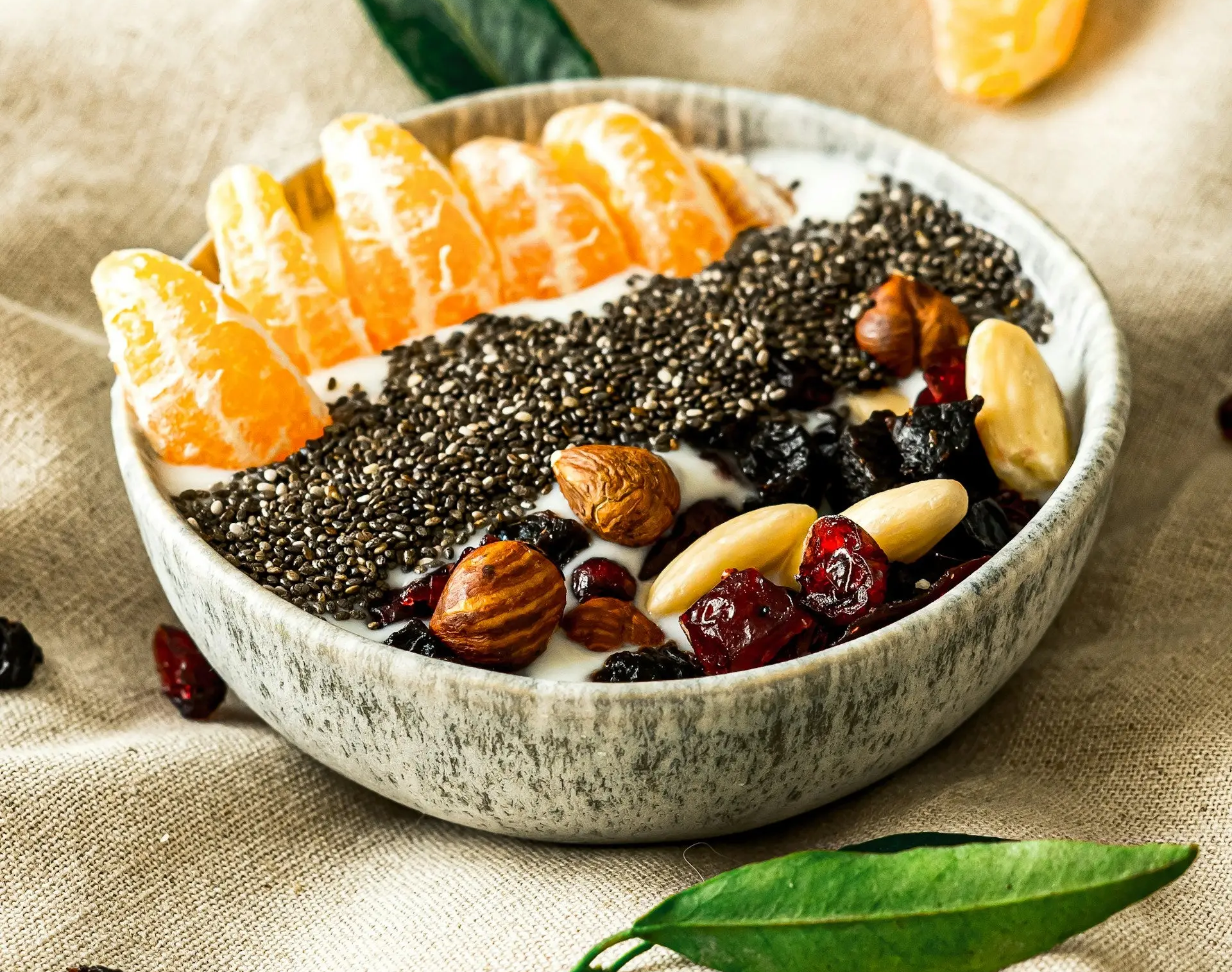Foods that are Perfect for Perimenopause

VIEW YOUR FREE ANTI-INFLAMMATORY MEAL PLAN HERE
Foods & Ingredients perfect to help navigate Perimenopause, according to a Nutritionist:
Perimenopause can be the pits. From staring at the ceiling at 3am to belly bloat and weight gain, the hormonal changes taking place can really make you feel out of whack. But did you know that there are some ways that you can help your body naturally manage hormonal changes and boost overall health after 40?
Join Registered Nutritionist Laura Jennings as she guides us through some of the best foods and ingredients to include in your diet during this life stage. With her expert insights, you’ll discover how to feel your best and embrace the vibrant years ahead.
Our top tips for diet changes and foods for focus.
Protein
Boosting our protein intake during this phase is crucial, as protein fuels the production of neurotransmitters and hormones essential for our bodies. Distributing protein evenly throughout the day helps curb cravings and keeps blood sugar levels stable, as protein breaks down into glucose more gradually compared to carbohydrates and fats. This steady release can prevent mood swings associated with fluctuating blood sugar levels, helping with emotional balance.
Aim for 30g+ protein per meal to ensure you are consuming enough for growth, repair and stabilising processes. When it comes to meat, opt for lean choices like chicken and turkey. They are rich in iron and B vitamins and provide all essential amino acids. Fish and seafood are excellent sources of high-quality protein and omega-3 fatty acids. Omega-3s, especially the DHA in oily fish, have anti-inflammatory properties and release anti-inflammatory resolvins throughout the body. Eggs are a versatile, complete protein source containing all nine essential amino acids, and they are rich in choline, which is key for memory regulation and muscle control.
Dairy products like yogurt, cottage cheese, and milk offer high-quality protein and are rich in calcium and vitamin D, both crucial for bone health, especially as bone density may decrease during perimenopause. *Some studies suggest that A2 milk, which is easier to digest for some people, may be a better option.
Legumes, such as beans, lentils, and chickpeas, are excellent plant-based sources of protein and fibre, which can help maintain stable blood sugar levels and support digestive health. Nuts and seeds provide a good amount of protein, healthy fats, and fibre, which can help manage weight and maintain heart health. Soy products, like tofu, tempeh, and edamame, are complete plant-based protein sources and contain phytoestrogens (our second food group – see below)
Protein powders and supplements can be a convenient way to ensure adequate protein intake, especially if dietary sources fall short. Excellent choices include whey, casein, and plant-based options like pea protein, catering to various preferences. Consider adding 4 teaspoons to your porridge or smoothies for an easy protein boost.
Phytoestrogen-containing foods
Phytoestrogens are plant-derived compounds that mimic oestrogen in the body, helping to balance hormone levels. They are found in soy products like tofu. Women who consume high amounts of soy foods often experience fewer hot flashes. This benefit is linked to isoflavones (a type of phytoestrogen) in soy, which possess mild oestrogen-like properties. Incorporating soy into the diet is associated with increased bone density, which is protective against age-related muscle mass loss (which is more likely to occur in late perimenopausal women, as women lose approximately 25% of bone mass). Other foods also containing phytoestrogens include flaxseeds, sesame seeds, chickpeas and lentils.
(Hot tip: If you're someone who struggles with bloating or IBS - try soaking legumes before consuming. It supports the body’s natural ability to break down these foods, reducing gas and bloating)
Fibre
Fibre is an essential part of the diet, crucial for weight management and overall gut and mental health. It feeds our gut microbes (a natural prebiotic), and a lack of fibre can lead to gut dysbiosis—an imbalance where harmful bacteria outweigh beneficial ones. This imbalance can cause leaky gut syndrome, allowing pathogens into the bloodstream and leading to inflammation, bloating, and poor mental health.
Fibre helps lower LDL (bad) cholesterol levels, reducing the risk of cardiovascular disease—a heightened concern during and after perimenopause. Additionally, fibre slows the absorption of glucose, aiding in the maintenance of stable blood sugar levels and reducing the risk of insulin resistance and type 2 diabetes. Excellent fibre options include fruits, vegetables, whole grains (such as oats, quinoa, and brown rice), legumes, and nuts and seeds like chia, hemp, and flax.
Probiotics
A healthy gut microbiome is crucial for hormone metabolism and preventing hormonal bloating. Probiotics, such as Lactobacillus and Bifidobacterium, are beneficial bacteria that enhance the diversity of gut microbes and lower the ratio of harmful bacteria. You can naturally boost your probiotic intake by consuming foods like yogurt, kefir, miso, sauerkraut, and kimchi.
Healthy Fats
Healthy fats act as a natural lubricant in the body. Consuming ample amounts of omega-3 fats can help alleviate symptoms of "drying out" during perimenopause, such as vaginal dryness and dry, brittle hair. Fats are essential to hormone production, including oestrogen and progesterone, which fluctuate during this period. Adequate intake of healthy fats supports hormone synthesis and balance. To increase omega-3 fatty acids in your diet, incorporate foods like fatty fish (salmon, mackerel, sardines), flaxseeds, chia seeds, and walnuts. Additionally, taking an omega-3 supplement along with evening primrose oil can further boost your omega-3 intake.
(Hot tip: A super easy way to increase fats is cooking with olive oil or drizzling it over your salads).
Change Your Relationship with Caffeine and Alcohol
This tip is invaluable for improving sleep, reducing hot flashes, combating fatigue, and easing irritability. Many people expect to feel exhausted after quitting coffee but often experience the opposite—increased energy levels, lower cortisol levels, and improved sleep quality.
Alcohol interferes with the body's regular detoxification processes. At night, your liver prioritises detoxifying alcohol over hormones, leading to an imbalance of circulating hormones. This effect becomes more pronounced after age 40. As we age, the pancreas produces less insulin, causing alcohol (a sugar source) to elevate blood sugar for longer periods. This increase in blood sugar promotes fat storage, especially around the abdomen, sometimes referred to as a ‘beer belly’.
Additionally, the organs responsible for metabolising alcohol shrink by 20-40% due to decreased blood flow in the liver, causing alcohol to stay in our system much longer. The brain also becomes more sensitive to the effects of alcohol as we age, which can impact cognitive function and increase the risk of Alzheimer's disease and mood disorders like anxiety and depression.
(Hot Tip: Create an alternative drink that you reach for. Whether that be a decaffeinated tea, collagen hot-chocolate or flavoured sparkling water).
Some ingredients to look out for or add into your diet
(Yes - they are all included within our Triple Threat Bundle, but for good reason!)
Chasteberry
Chasteberry, also known as Vitex agnus-castus, is a plant native to Mediterranean countries that has shown success in clinical trials for reducing menopausal symptoms related to blood vessel constriction or dilation, such as hot flashes, night sweats, heart palpitations, and changes in blood pressure. Chasteberry is known for its ability to balance hormones by influencing the pituitary gland, helping to regulate the production of oestrogen and progesterone.
California Poppy
California poppy (Eschscholzia californica) seeds and extracts are known for their calming effects, which help reduce anxiety—a common symptom during perimenopause due to hormonal fluctuations. The sedative properties of California poppy can improve sleep quality, promoting relaxation and better sleep for women experiencing disrupted sleep. Unlike some prescription medications for anxiety and sleep, California poppy is a safer long-term alternative as it doesn't have the addictive properties of other sleep promoting medications.
Fennel seeds
Fennel seeds are known for their ability to reduce bloating and water retention. They have diuretic properties that promote the elimination of excess fluids from the body. This can alleviate discomfort and swelling, making fennel seeds a natural and effective remedy for managing bloating and water retention.
Vitamin B
The B vitamins, including B6, B12, and B9 (folate), play crucial roles in converting food into energy, supporting red blood cell formation, moving oxygen around the body and maintaining brain function. These vitamins help combat fatigue and boost overall energy, making them vital for managing the increased tiredness often experienced during perimenopause.
Vitamin D
As oestrogen levels decrease, the risk of bone loss and osteoporosis rises. Vitamin D plays a crucial role in calcium absorption, vital for maintaining strong bones and density. It also influences serotonin production, a neurotransmitter crucial for mood regulation. Insufficient vitamin D levels may contribute to mood swings, anxiety, and depression, common during perimenopause. While sunlight exposure is the primary source of vitamin D synthesis in the skin, factors like sunscreen, clothing, and darker skin tones can hinder this process. Apart from sunlight, vitamin D can be sourced from fatty fish, fortified foods, and supplements.
Ginko Biloba
Ginkgo biloba, often called the 'brain herb,' is renowned for its brain health benefits. This herb enhances blood circulation to the brain, improving cognitive function, memory, and mental clarity. By supporting brain health, Ginkgo biloba helps manage cognitive changes and memory lapses that some women experience during perimenopause. Its antioxidant properties protect brain cells from oxidative stress, further promoting brain functioning.
Kava kava
This herb helps improve mood, especially by reducing anxiety in both individuals with and without perimenopausal symptoms. By promoting relaxation and mental calmness, it can alleviate mood swings and irritability.
Kelp
Kelp, a nutrient-rich seaweed, stands out as one of nature’s richest sources of iodine. Thanks to its high bioavailability, our bodies can easily absorb and utilise the iodine from kelp, making it more effective than other sources. Iodine is essential for optimal thyroid function, which in turn regulates hormones that influence metabolism, mood, and energy levels.
Moreover, kelp is packed with vital minerals like calcium and magnesium, which play a crucial role in maintaining bone health and preventing age-related muscle loss. Adding kelp to your diet can be a powerful way to support your body's changing needs during this transitional phase.
Bee Pollen
Some studies suggest that bee pollen’s antioxidant and anti-inflammatory properties can help alleviate common perimenopausal symptoms such as hot flashes, mood swings, and irregular periods. While more research is needed to confirm these findings, it is well-known that the nutrient-rich composition of bee pollen can combat fatigue and boost energy levels. Simply sprinkle on top of smoothies and porridge.
Adaptogens
Adaptogens such as American Ginseng and Ashwagandha enhance the body’s ability to cope with stress and alleviate anxiety. Known for boosting vitality and overall energy levels, these adaptogens prove particularly beneficial during this life stage.
Where to start?
That’s a lot to take in. We know. We recommend starting small, and looking for ways you can make daily choices to support hormonal health and prioritise overall health. It’s not as hard as you think!


